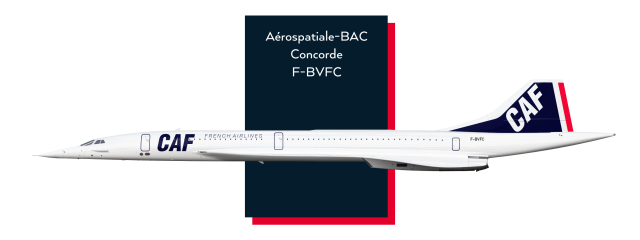
Flight 4590 crash and the end of Concorde service
- Owner: Avelo (View all images and albums)
- Uploaded: Jul 21 2021 10:41 PM
- Views: 1,121
- Album CAF French Airlines

Although Concorde enjoyed a privileged status as CAF's ultra-flagship airliner for more than two decades since its debut, its reputation would be forever tarnished after the disaster of Flight 4590 on 25 July 2000 when it crashed just minutes after takeoff from Paris's Charles de Gaulle Airport on its way to New York. The aircraft operating the flight (registered F-BTSC) ran over a piece of fallen metal from a Continental Airlines DC-10-30 that departed five minutes earlier, causing the left landing gear tyre to burst and puncture the underside of the left fuel tank. The left fuel tank was full, and the resulting lack of air space in the tank caused it to rupture and send fuel pouring outward with great force when debris from the tyre struck the wing and created a shock wave that subsequently weakened the tank. As debris flew into the landing gear bay and severed much of the aircraft's power wiring, retracting the gear became impossible as the aircraft climbed. Sparks produced by broken wiring would ignite fuel from the ruptured fuel tank, causing the left wing to burn in flames which reduced thrust in engines 1 and 2. After roughly two minutes in the air, Flight 4590 crashed into a nearby airport hotel in the commune of Gonesse, killing all 109 passengers and crew on board as well as 4 people on the ground. All Concordes would be grounded a few days after the crash, and its short-lived return to service would be contingent upon findings involving the cause of the crash as well as possible remedies. After CAF made extensive safety upgrades to the airframes, Concorde finally resumed service in November 2001.
In addition to greatly reduced passenger numbers after the crash of Flight 4590, the aftermath of the 9/11 attacks in the United States and the subsequent recession in air travel, as well as skyrocketing maintenance costs, were other contributing factors that would lead to Concorde's eventual demise. During the two and a half decades Concorde flew for CAF, the supersonic aircraft has been a money-losing venture for the airline, and because of this it was widely perceived by the French public as serving nothing more than a purpose of national pride. Citing all these factors combined, CAF announced the cessation of all Concorde service in 2002 with the final flight operating from New York (JFK) to Paris (CDG) on 27 June 2003. The surviving Concorde airframes still remain preserved at aircraft museums in Paris, France; Sinsheim, Germany; and Washington, D.C. in the United States.

 Sign In
Sign In Create Account
Create Account










